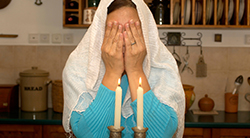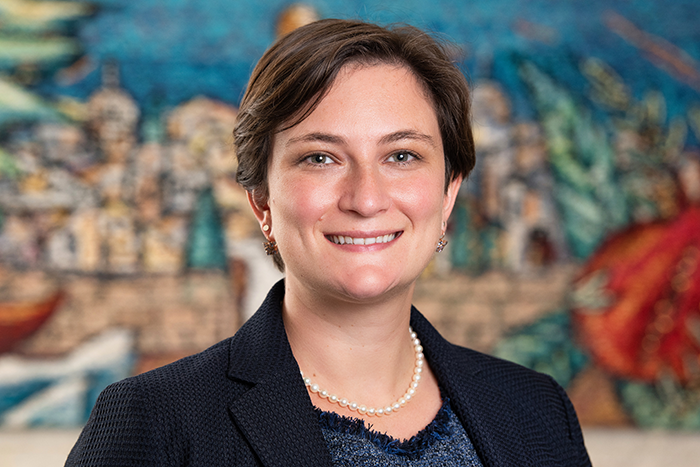 T’rumah opens with a call for the Israelites to bring to God what the standard English translation calls “gifts”:
T’rumah opens with a call for the Israelites to bring to God what the standard English translation calls “gifts”:
The Eternal spoke to Moses, saying: Tell the Israelite people to bring Me gifts; you shall accept gifts for Me from every person whose heart is so moved.
(Ex. 25:1-2, translation in The Torah: A Modern Commentary, rev. ed.)
After enumerating the precious metals, stones, and materials that would constitute such gifts, we learn the purpose:
And let them make Me a sanctuary that I may dwell among them. (Ex. 25:8)
What appears straightforward in this English translation of the first two verses (which is based on the New Jewish Publication Society translation) is less clear when one tries to ferret out the conceptual meaning of the text directly in the biblical Hebrew. To get more of a sense of the nuances of the original text, we can turn to the translation of the literary scholar, Robert Alter, who attempts to capture the unique artistic and linguistic style of the Bible in well-crafted English that communicates the linguistic challenges of interpreting an ancient text. Alter translates the Torah portion’s opening verses (Ex. 25:1-2; 8) as:
And the Lord spoke to Moses, saying: “Speak to the Israelites, that they take Me a donation from every man, as his heart may urge you shall take My donation ... And they shall make Me a Tabernacle, that I may abide in their midst. (Ex. 25:1-2, translation in Robert Alter, The Five Books of Moses, pp. 460-1)
As a quest for making the human-divine partnership seem tangible, the Torah proposes the idea of a making a sanctuary for God. Using Alter’s English rendering, we can get more into figuring out the meaning and implications of this. While from the outset we probably wondered about the idea of gift giving or donating to God, the Torah’s use of the verb “to take” instead of “to give” or “to bring” cries out for interpretation, to paraphrase what the great Torah commentator Rashi (1040-1105, France) has said.
We might also ask about the word being translated as “donation,” t’rumah in Hebrew, which Alter tells us in a note is derived from a verb meaning “to elevate” (ibid., p. 460). Does this root-meaning add anything more to our understanding of what’s going on here?
Why does the Torah talk about “taking a donation” when the intention is clearly “to give” or “to bring” donations to God? A linguistic investigation can lead to insights into human psychology. “Take and give” is a drilled-down summary of what Abraham ibn Ezra (1089-1167, Spain) explains (about Ex. 25:2) that in order to give something away we have to take it from ourselves. In other words, true gift giving is about giving something up.
T’rumah – the name of this particular gift for the sanctuary – suggests that this heartfelt gift (see verse 2) can be called elevated. The Rabbinic midrash on Exodus, known as Sh’mot Rabbah, spiritually expands on the elevated nature of this gift. Noticing that throughout the Torah Moses is described as “going up” to commune with God, the midrash suggests that through gift giving to build the sanctuary, all of the Israelites are able, as it were, to ascend toward the Divine (Sh’mot Rabbah 33:2).
Modern secular Zionism is known for appropriating religious symbols for the purpose of infusing Jewish cultural meaning into modern state-building. Naomi Shemer (1930-2004), the popular, influential Israeli lyricist and composer, connects the language of building the sanctuary and the Holy Temple with the revival of the physical and cultural presence of Jews in their ancient homeland in her composition, “Father’s Song” (Shiro shel Aba). The song is often known by its refrain taken from a popular Chasidic song, “Let the Temple Be Built,” Yibaneh Hamikdash. That central word, mikdash, hearkens back to this week’s Torah reading where it means “sanctuary” or “Tabernacle” (Ex. 25:8), and later comes to mean “Temple.” Shemer’s song begins:
If on the mountain you quarry stone
to erect a new building,
my brother – you have not quarried in vain
for that new building.
Because from these stones
The Temple will be built.
Shemer, the secular kibbutznik, links the physical efforts employed by individual Zionists to rebuild the Land. The State of Israel as a national collective expresses this linkage through its adoption of the Temple’s Menorah as the national symbol. As a songwriter, it is not surprising that Naomi Shemer is drawn to the centrality of song in the ancient Temple as an opportunity to inspirationally frame the rebirth of Hebrew culture. Shemer’s song ends:
If you have not yet sung a song to me,
sing me a new psalm,
which is older than wine
and sweeter than honey.
A song older than wine,
And sweeter than honey,
A song two-thousand years old
And new every day.
In this last stanza of this three-stanza song, Shemer harnesses the inherited symbols of Jewish heritage for celebrating the revival of Hebrew language and culture writ large, and for how this ancient tongue reborn will be expressed meaningfully in interpersonal comunication. Shemer is not just singing about this new modern Israeli culture. In fact, Shemer’s words and music are synonymous with the growth of Israeli culture in the first 40 years of the state. Today, as self-proclaimed secular Israelis are becoming increasingly interested in Jewish tradition and culture – a Jewish renewal that began after Rabin’s assassination in the early 1990s – Shemer’s songs, which draw so much from the many layers of our sacred tradition, are being incorporated into the creation of new rituals and prayer services in Israeli progressive synagogues and in new gatherings for a uniquely Israeli secular Judaism. In these places, I think Naomi Shemer would encourage this new phenomenon by saying: sing a new psalm, which is older than wine and sweeter than honey.
Rabbi Reuven Greenvald is the director of Israel engagement for the Union for Reform Judaism (URJ).

(This davar acher on Parashat T'rumah draws on Naomi Shemer’s “Father’s Song” [Shiro shel Aba] and Exodus 25 as punctuation and inspiration to trace the evolution of a woman’s life from childhood to adulthood.)
She races home from school to meet her mother. She helps put the china on the white table cloth, feeling pride as she sets the silver in their Shabbas homes.
Hours later, she watches as the match hits the box, igniting in flame. The hands that hug and comfort make one, two, three circles around these lights. As the hands lower, her mother smiles over the table she has set, over the family she has created, over the house she has built: “Shabbat Shalom.”
Older than wine and sweeter than honey.
She pulls into the driveway a half hour before sun down, angsty teen melodies blaring out of the windows. She is greeted by her mother’s aggravation, “Our friends will be here soon.” She makes excuses, then pleads to be set free. “They are your friends. Can’t I go spend time with mine?”
An hour later, she waits for her mother’s head to lift from her hands, a sign that soon the blessings will be over and she will be allowed to leave.
Sing a new psalm.
She wanders around campus at sunset. She knows Shabbat is happening. She thinks she hears L’cha Dodi across the quad. But those voices are not her voices, those people are not her people. Everything is new here. New schedule. New friends. New. She yearns for something...
older than wine.
She enters Shabbat angry. She’s been studying. Learning about how men were the builders. Builders of Torah, communities, tradition. Their hearts were moved, not hers. She never realized learning could come at such a price – an erasure of her Torah, her community, her tradition. Where was she?
Sing a new psalm, which is older than wine.
She frantically cleans her home. Her mother is coming for Shabbat, and her children are running late. She puts out the white tablecloth. She contemplates the china and her d’var Torah for the evening. She sets out the silver.
With the lights underneath her hands, she looks out onto her family. Across the table of her ancestors, she sees her daughter. She smiles. The first circle – older than wine. The second circle – sweeter than honey. The third circle – the new psalm she sings as she becomes tradition:
Make for Me a sanctuary,
A sanctuary built from your heart,
And your heart,
And yours.
Bring your gifts,
Bring your story,
Bring your Torah.
Bring you.
So that I may dwell,
Comfortably,
Among you.
Sing a new psalm, which is older than wine and sweeter than honey.
Rabbi Eliana Fischel is the assistant rabbi at Washington Hebrew Congregation in Washington, D.C.
T’rumah, Exodus 25:1-27:19
The Torah: A Modern Commentary, pp. 604-611; Revised Edition, pp. 543-558
The Torah: A Women’s Commentary, pp. 451-472
Haftarah I Kings 5:26-6:13
The Torah: A Modern Commentary, pp.717-718; Revised Edition, 559-560
Explore Jewish Life and Get Inspired
Subscribe for Emails


